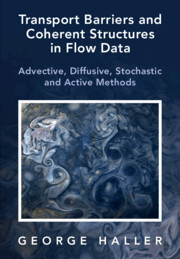 Transport Barriers and Coherent Structures in Flow Data
Transport Barriers and Coherent Structures in Flow Data Published online by Cambridge University Press: 20 February 2023
In this chapter, we will be concerned with barriers to the transport of inertial (i.e., small but finite-size) particles in a carrier fluid. As a general rule, the more the density of inertial particles diverts from the carrier fluid density, the more they tend to depart from fluid trajectories. Specifically, while small enough neutrally buoyant particles often remain close to fluid motion, the same is not true for heavy particles (aerosols) and light particles (bubbles). Practical flow problems involving inertial particles tend to be temporally aperiodic and hence the machinery of LCSs discussed in earlier chaptersis also highly relevant for inertial particles. By inertial LCSs (or iLCSs, for short), we mean coherent structures composed of distinguished inertial particles that govern inertial transport patterns. In contrast, LCSs (composed of distinguished fluid particles) govern fluid transport patterns. The purpose of this chapter is to examine how iLCSs differ from LCSs of the carrier fluid.
To save this book to your Kindle, first ensure [email protected] is added to your Approved Personal Document E-mail List under your Personal Document Settings on the Manage Your Content and Devices page of your Amazon account. Then enter the ‘name’ part of your Kindle email address below. Find out more about saving to your Kindle.
Note you can select to save to either the @free.kindle.com or @kindle.com variations. ‘@free.kindle.com’ emails are free but can only be saved to your device when it is connected to wi-fi. ‘@kindle.com’ emails can be delivered even when you are not connected to wi-fi, but note that service fees apply.
Find out more about the Kindle Personal Document Service.
To save content items to your account, please confirm that you agree to abide by our usage policies. If this is the first time you use this feature, you will be asked to authorise Cambridge Core to connect with your account. Find out more about saving content to Dropbox.
To save content items to your account, please confirm that you agree to abide by our usage policies. If this is the first time you use this feature, you will be asked to authorise Cambridge Core to connect with your account. Find out more about saving content to Google Drive.